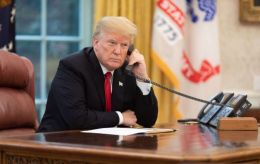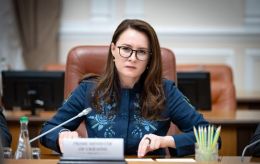EU Special Envoy for Sanctions David O'Sullivan: Time is in Ukraine's favor, not Russia's
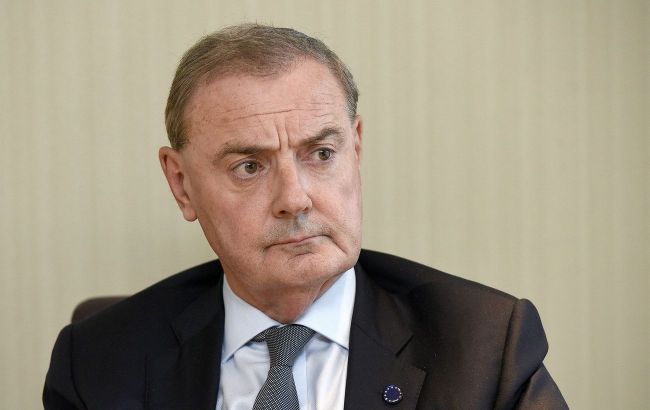 David O'Sullivan (photo: Kaniuka Ruslan/Ukrinform/Future Publishing via Getty Images)
David O'Sullivan (photo: Kaniuka Ruslan/Ukrinform/Future Publishing via Getty Images)
EU Special Envoy for Sanctions David O'Sullivan discussed the use of frozen Russian billions to aid Ukraine, Russian sanction evasion schemes, and how they are slowly but surely undermining the Russian economy in an interview with RBC-Ukraine.
Ukraine feels the reluctance of many of its Western partners to cross red lines not only in military support but also financially. At the start of Russia's full-scale invasion, Western countries froze approximately $300 billion in Russian assets, over $240 billion of which are in Europe.
However, more than two years later, these funds have not been allocated to help Ukraine, which would be the most obvious way to use them. The West is clearly not ready to confiscate these frozen funds as the most optimal solution due to prevailing concerns that it would undermine trust in its own financial system.
Nonetheless, significant progress has been made recently on this issue. The European Union has nearly agreed on a plan to use the Russian assets, directing the windfall profits from them to Ukraine, with an initial discussion of €2.5-3 billion. However, launching the mechanism requires another unanimous decision from EU member states, currently blocked by Hungary.
Meanwhile, the G7 countries, initiated by the United States, are working on a more ambitious project to allocate up to $50 billion to Ukraine and later reimburse these funds from the future income of those same frozen assets of the aggressor country.
In his conversation with RBC-Ukraine, EU sanctions envoy David O'Sullivan is cautiously optimistic. He hopes that the final decision to allocate funds to Ukraine from the EU will be made in the coming weeks, with Kyiv potentially receiving the first funds this summer.
- Let's start with the Russian frozen assets. When will this mechanism of transferring the income from these assets to Ukraine finally become operational? When can Ukraine receive the first tranche of money? And how is this mechanism consistent with the G7 plan about providing us with 50 or something billion dollars soon and then repaying the debt by the profit from these assets?
- The decision has already been taken that this money will be used for Ukraine. That decision was taken last week. What is yet to be decided is the precise mechanism, the legal mechanism by which this money will be transferred and we hope that the decision will be taken in the next few weeks.
- Do you need to have Hungary's support for this too? So does this decision need to be taken unanimously?
- Yes, correct. But I mean I'm fairly confident that in the next few weeks, in June, this money will be disbursed. In parallel, there are, as you say, discussions in the G7 about the idea of eventually using this money as repayments on a loan. Those discussions are ongoing.
The important thing is that we, from the EU side, have immobilized this money and in one way or another it will be used for Ukraine. So, in the short term, probably there will be a transfer for military purchases, but if it is decided at the level of the G7 that it's better leveraged to get more money through a loan, then that decision can be taken later. So there will be further discussions in the G7 in June. It's a slightly complicated discussion, but it's a line of action that is actively being considered.
- So if everything goes just as planned, when will Ukraine be able to get the first tranche of this money from the EU? Are we talking about summer?
- We're talking about summer. I wouldn't like to promise exactly when the money will be in the account, but the decisions will be taken in the next few weeks and the payment made subsequently.
- This is the 14th package of EU sanctions that is debated now – what are the prospects of its adoption and will it include the ban on the re-export of Russian LNG and the 'shadow fleet' that Russia actively uses?
- We have indeed proposed measures both in the energy and maritime sectors. I'm fairly confident that it will be agreed upon in June, hopefully by the middle of June, let's say. So we are making a lot of progress on the discussions, and indeed it includes measures to address the issue of the 'shadow fleet'. It's in a proposal, it's not yet confirmed and it will need unanimity approval.
- Russia continues to use both smuggling and chains of different shell companies to circumvent sanctions. It manages to purchase, in particular, Western-made microelectronics that are then used in their missiles. What can be done with this?
- We have identified very clearly, with the help of the Ukrainian authorities and Ukrainian scientific experts, the most damaging products, some 50 HS codes, and we are actively fighting the illegal trade in these goods. To be very honest, I think we have to be clear-eyed about this, there will always be circumvention.
- And you cannot totally avoid it, can you?
- You cannot. I mean, it is like the war on drugs. There is money to be made through circumvention, so you will always find people who are willing to profit from it. Our objective is to make it harder, to make it slower, and to make it more expensive all the time. So, by shutting off existing channels of circumvention, we constantly force Russia to put new ones in place, we make it more complicated, so the supply chain becomes unpredictable and unreliable, and ultimately it becomes more expensive because you have more middle people involved who are taking a certain percentage. And this is what we're doing.
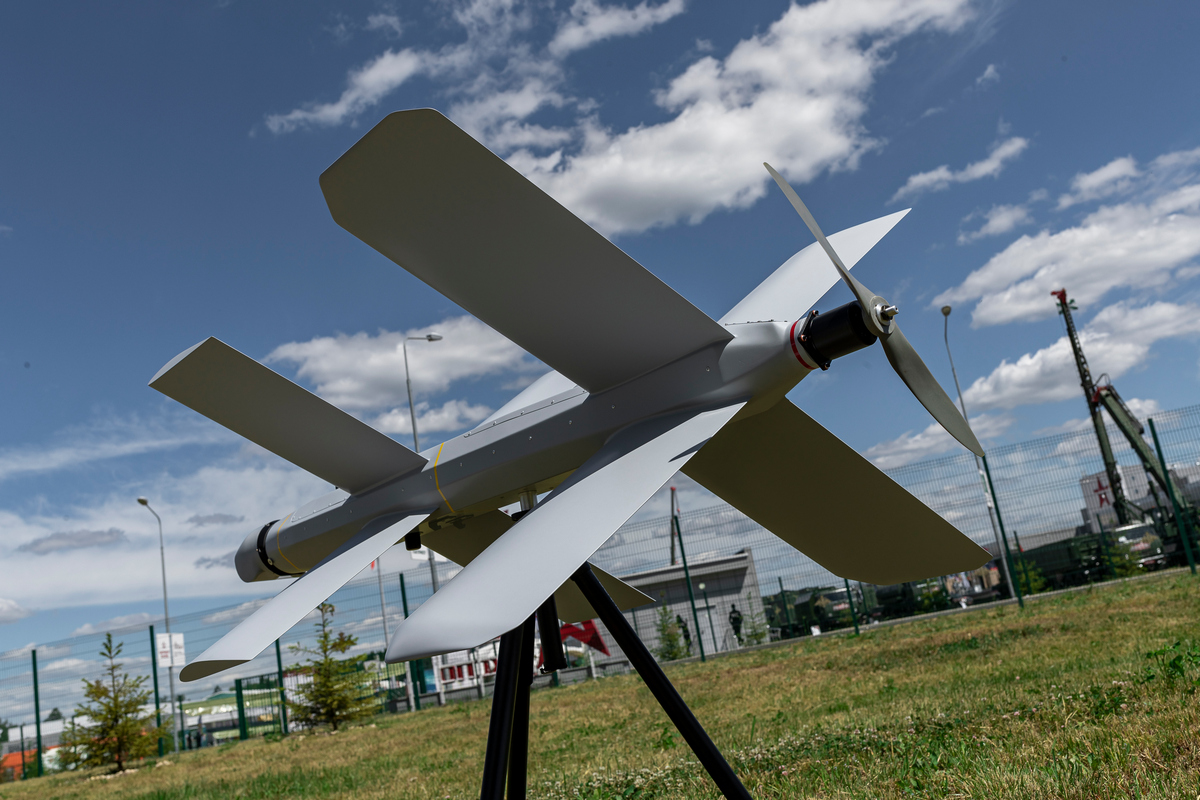
Russian Lancet UAV with up to twenty Western components (photo: armyinform.com.ua)
- I spend a lot of my time traveling in third countries in Central Asia and the Caucasus, now in Southeast Asia, trying to persuade countries who are not applying our sanctions but whose territory is being used for sanctions circumvention not to allow this kind of trade. Because we know these goods may look innocent and civilian, that's mostly microelectronics, advanced technology, microchips, integrated circuits, optical readers, flash memory cards, things which have perfectly innocent civilian use in normal times, but we know if they are going to Russia, they are going into making missiles and drones and artillery shells smarter and more lethal. So that's a very important part of my work.
- Is it possible to influence Western manufacturers to improve their control system?
- I must say, we work very closely with our companies. There are no direct exports to Russia. Transit through Russia of weapons as well as dual use and other sensitive goods to third countries is also no longer possible. And all of our companies, and there are not many companies who manufacture these products, are well aware of the issue and they're all fully committed to preventing circumvention. But in fairness to the companies, some of the components that have been found were manufactured many years ago and probably found their way into the distribution network long before sanctions.
- But some of them were produced in 2022-2023.
- Yes, this is true. If you take 2022, the sanctions were only starting. So, you know, I'm not making excuses. I'm just saying that there are legitimate reasons why old stock could find its way there. We're also finding stuff made much more recently and this is because, indeed, it is being shipped innocently to somewhere from where it finds its way to Russia, either directly from that country or through other countries.
And this is where we invest a lot together with the US and UK in particular, in working to identify these circuits of circumvention and shutting them down.
- To what extent is the EU ready to use or intensify the secondary sanctions to combat this circumvention?
- The EU has a very strong principal objection to the extraterritorial sanctions. This is something we have always had and I don't think we're going to change that. But as long as there is a European nexus, as long as there is a European connection to individuals and companies in third countries who are circumventing sanctions, we are looking at ways, we have the possibility, which we use quite regularly now, to list entities, companies in third countries whom we identify as being part of a procurement network for circumventing sanctions. And we make it impossible for European companies to trade with them in those most sensitive goods.
- I want to ask you specifically about one country that used to be maybe the biggest partner of Russia, particularly in providing different goods, including double-use ones, and this is obviously China. So what could be done, will be done, should be done with this?
- China occupies a massive place in global trade anyway. They produce a lot of these goods, some of which are by Chinese manufacturers, and some are manufactured in China by subsidiaries of Western companies. So we have already listed some companies in China whom we've identified as being part of this circumvention, and it has been raised with the Chinese authorities at the very highest level by President von der Leyen, by President Michel when they had a summit with President Xi last December.
Our member states have raised this at the head of state level also, President Macron and Chancellor Scholz. So we are actively engaged with China, but of course, you know the Chinese position – they don't wish to apply our sanctions and they, formally speaking, say that they don't supply military goods. But these goods, unfortunately, as we know, don't look like military goods, but actually have military applications. And this is a conversation we will continue to have with China to encourage them to understand the danger of this trade.
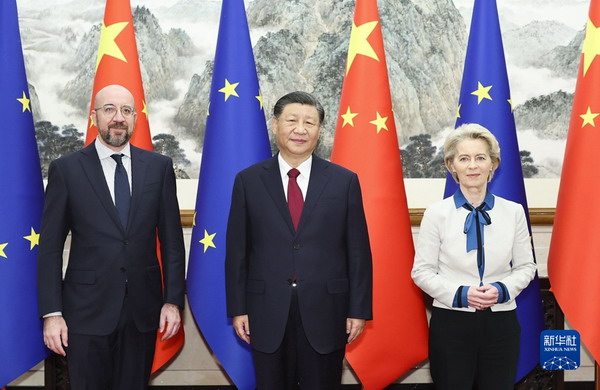
Charles Michel, Xi Jinping and Ursula von der Leyen in Beijing (photo: mfa.gov.cn)
- Personal sanctions against Russian politicians, military leaders, and everyone who is involved in this war. Do you think that they proved to be effective? And what are the plans, maybe including certain new categories of people in these sanctions lists? And what about the sanctions against the Russian oligarchs that they also try to circumvent or fight in courts, in European courts, sometimes even successfully?
- Now we have an extensive list of individuals who are sanctioned. For many of the oligarchs, this has included seizing their assets, whether this is property, houses, yachts, and so forth, freezing bank accounts, and preventing them from getting profit from the companies that they own. So, I mean, this is already done. We continuously update this. We certainly sanction a lot of actors in Russia who are engaged in the war, either militarily or in economic support. And this is a continuous process.
The 14th package contains a new list of names. This does have an impact on these individuals. Their bank accounts in Europe are frozen, and they cannot travel to Europe, so it certainly has consequences for these people and it's a list that we constantly revisit.
You are right, everything we do is subject to the rule of law and to the ultimate control of the court, and the court has occasionally pointed out to us that the evidence was not sufficient or that the case was not sufficient.
- Against this or that person.
- Exactly, against individuals. But I have to say there was certainly one case a couple of weeks ago with two individuals in particular. The court cancelled a listing but those two individuals were also listed under another criterion and that listing still stands. So, in practice, the decision of the court did not change anything for the individuals concerned.
- Despite 2+ years of extensive international, in particular, European sanctions, the Russian economy has not collapsed, on the contrary, it is even showing growth in several KPI. So has the EU maybe done something wrong with the general, fundamental approach to sanctions, maybe something should be fixed or will be fixed?
- I think it's important to note that these are not just EU sanctions, these are G7 sanctions, so we are part of a very large coalition of the most economically important countries in the world.
When you look at the functioning of the Russian economy these sanctions are having a massive impact. They have seriously restricted the revenue available to fund this war. We estimate that Russia has about four hundred billion euros less than it would have had if there were no sanctions.
What used to be a very healthy government surplus in Russia is now a deficit, thirty percent of public expenditure is going into defense, some six or seven percent of GDP.
Of course, if you pump that kind of money into the economy you do get growth but it's not productive growth because what Mr. Putin has been forced to do is to cannibalize the Russian economy to take from the productive sector – education, health care, research, investment in legitimate economic activity – and transfer it all to weapons and war.
You can do that for a certain amount of time but at a certain moment, it becomes unsustainable. There is no investment going into Russia, there's no new technology going into Russia, if you look at the labor market – someone one million of the best-educated Russians have left and will probably not come back.
And equally, the mobilization has sucked unskilled labor out of the economy, there are massive shortages in agriculture and construction and so forth.
So the medium-term perspective of the Russian economy is very very poor. The problem is this is more a slow puncture than a blowout of the tire. So it's going to take a bit longer to show a real impact on Russian behavior than perhaps some people initially thought at the very beginning.
But it is going to show and I think most economists would converge that sometime next year, in the course of next year, Russia is going to have some kind of economic reckoning. So this does not necessarily fit with the time frame of a war that is happening, Ukrainian people are dying every day and we acknowledge that. That's why the other forms of assistance are so vital, military assistance, of course, first and foremost air defense, and macroeconomic assistance, to help Ukraine's economy continue to function.
But sanctions are having a major impact on Russia and I have no doubt that this will become more and more evident as time goes by.
- So is it fair to say that time is generally playing in favor of Ukraine, not Russia?
- Yes.
